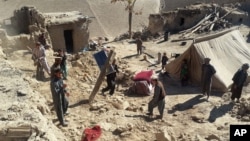As aid agencies gear up for rescue or relief operations in a country as rife with armed conflict as Afghanistan, one of their biggest challenges is to do it securely.
Often that includes coordinating with armed groups, including the Taliban, either through local tribal elders or other sources.
“When you want to deliver assistance or deploy teams in an insecure area, you have to make sure you establish contacts with armed groups,” according to Abdulrahman Kalantary, the disaster management director of the Afghan Red Crescent Society.
In Kunar province, where earthquake fatalities are highest, local elders from Sawkai district confirmed to VOA’s stringer they spoke to militants in the area who agreed not to disturb relief operations.
Muhibullah Danish, operations director and deputy country director for aid group Mercy Corps, said they deal with the security challenges by coordinating their operations with local communities.
“Whenever we feel a location is not safe for us we talk to the community leaders and they in turn talk to the insurgent groups,” Danish said.
Mercy Corps teams, he added, do not go to an area until they have made sure that the local leaders have talked to all the groups operating in the area, not just some of them.
In a mostly tribal society like Afghanistan, local elders hold considerable sway. Aid groups understand elders not only know whom to talk to, but also how to talk to them in their own language.
Such careful coordination, however, only takes care of one threat. Several others remain.
“The roads are not under the control of the community leaders so that is a challenge,” Danish said.
The lawlessness of the past several decades in Afghanistan has also given rise to criminal groups, which relief workers say sometimes pose a bigger threat than the militants since they are not in anyone’s control.
At particularly high risk are foreign aid workers, who are prime targets for kidnappings for ransom, which is why most agencies leave fieldwork to their local employees.
Even local teams have to contend with criminal activity, such as theft and looting of their equipment, particularly in field offices.
Groups like Mercy Corps try to keep a low profile to avoid attention of criminal groups.
Other conflict related issues include making sure there are "no land mines or military operation on the ground,” Kalantary of Red Crescent pointed out.
Roadside IEDs are considered another risk factor that many find hard to mitigate.
Even when they have eliminated most of the risks, aid workers can become victims. Danish of Mercy Corps remembered a staff member who lost his eye while traveling from Mazar e Sharif to Kunduz and got involved in an IED explosion targeting the Afghan National Army.




